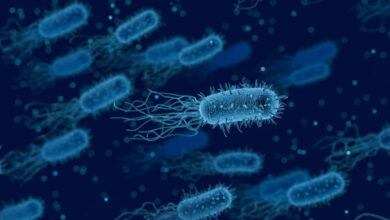New Treatment for Food Allergies? Dietary Supplement Shows Promising Results


University of Michigan research suggests that inulin, a plant fiber, could be a new way to treat food allergies by preventing reactions and promoting long-term tolerance by targeting gut bacteria.
A study from the University of Michigan has identified a new potential treatment for food allergies using inulin, a plant fiber known for its safety and versatility. The research showed that inulin gel-based oral immunotherapy could effectively prevent allergic reactions in mice by targeting gut bacteria and promoting tolerance to various allergens. This innovative approach could offer sustained relief from food allergies, with further research needed to move towards clinical applications.
A University of Michigan study has discovered that inulin, a plant fiber often used as a supplement, prebiotic in sodas, sweetener substitute, and in various other products, may serve as a new treatment option for food allergies.
In what appears to be a major advancement that offers the promise of relief to food allergy sufferers around the world, the paper published in Nature Materials describes inulin gel-based oral immunotherapy’s success in stopping allergic reactions in mice by, in part, targeting bacteria in the gut. The gel prevented severe allergic reactions during and even after being administered, including reactions to common triggers such as peanuts, egg whites, and milk.
Multidisciplinary Research Approach
The research, conducted by an international team of scientists in pharmaceutical sciences, biomedical and chemical engineering, internal medicine, and other specialties, proposes that inulin gel addresses the root cause of food allergies, rather than just managing symptoms.
The research was led by James Moon from U-M’s College of Pharmacy. He has studied inulin’s potential to treat disease for years. He said inulin gel-based therapy holds great promise due to its safety profile and potential for large-scale production.
“Inulin, a widely consumed dietary fiber recognized as safe by the FDA, forms the basis of the gel, making it a feasible and translatable option for clinical use,” said Moon, whose lab develops drug delivery technologies combined with pharmaceutics and engineering to identify ways for the body to fight disease. Moon is the J. G. Searle Professor of Pharmaceutical Sciences.
While further research and clinical trials are needed to test the findings, the study, which emphasized the role of the small intestine’s microbiota and metabolites in food allergy regulation, opens potentially life-changing new avenues for therapeutic interventions, he said. Other, newer treatment options have seen low uptake due to adverse reactions and spotty effectiveness.
Prevalence and Impact of Food Allergies
As many as 1 in 3 adults and more than 1 in 4 children have food allergies, a life-altering condition that is getting harder to manage as allergens can be hidden in a variety of foods and drinks, according to the Centers for Disease Control and Prevention.
Food allergies have become a significant concern globally, especially in developed nations, as accidental exposure to allergens can trigger severe reactions, including death.
The research found that inulin gel, specifically formulated with an allergen, normalized the imbalanced intestinal microbiota and metabolites in allergic mice. This normalization led to the establishment of allergen-specific oral tolerance, effectively suppressing allergic reactions to various food allergens.
“The therapy showed long-lasting protection even after the cessation of treatment, indicating its potential for sustained relief from food allergies,” said Fang Xie, a graduate student who also led the studies.
Inulins are a group of polysaccharides and natural storage carbohydrates in more than 36,000 plant species, including wheat, onion, asparagus, and chicory, which is most often used to manufacture supplements.
The fiber is also the subject of research and clinical trials investigating its role in treating or leading to a better understanding of cancerous tumors, gastrointestinal illnesses, diabetes, and other diseases.
Reference: “Inulin-gel-based oral immunotherapy remodels the small intestinal microbiome and suppresses food allergy” by Kai Han, Fang Xie, Olamide Animasahun, Minal Nenwani, Sho Kitamoto, Yeji Kim, May Thazin Phoo, Jin Xu, Fulei Wuchu, Kehinde Omoloja, Abhinav Achreja, Srinadh Choppara, Zhaoheng Li, Wang Gong, Young Seok Cho, Hannah Dobson, Jinsung Ahn, Xingwu Zhou, Xuehui Huang, Xinran An, Alexander Kim, Yao Xu, Qi Wu, Soo-Hong Lee, Jessica J. O’Konek, Yuying Xie, Yu Leo Lei, Nobuhiko Kamada, Deepak Nagrath and James J. Moon, 8 July 2024, Nature Materials.
DOI: 10.1038/s41563-024-01909-w
The researchers whose work went into the study represent institutions around the world, including the University of Texas M.D. Anderson Cancer Center, Dongguk University, Seoul, Republic of Korea, Michigan State University, the University of Washington and WPI Immunology Frontier Research Center, Osaka University, Japan. Additionally, researchers from the University of Michigan represent the Biointerfaces Institute, the departments of Pharmaceutical Sciences, Biomedical Engineering, Chemical Engineering and Internal Medicine and the Mary H. Weiser Food Allergy Center.
Disclaimer: Moon declares financial interests for board membership, as a paid consultant, for research funding, and/or as an equity holder in EVOQ Therapeutics and Saros Therapeutics, and U-M has a financial interest in EVOQ Therapeutics, Inc. The other authors declare no competing interests.



